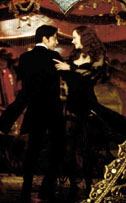
Movie Guru Rating:

Comment
on this review
| |

Moulin Rouge soars and sings and means every word
by Adrienne Martini
As a critic, one cultivates an air, a world-weary, seen-it-all sort of heavily-sighing countenance that is indicative of a big brain, big thoughts, and lofty goals about what art is and how cooly detached it must be to make one think. Anything that engages the heart (a sloppy, somewhat maudlin organ) must be inadequate and lacking the proper intellectual distance to truly say something oh-so-important about the world in which we are forced to live. Jaded? Certainly. Well-schooled in slouching irony? Most definitely. And decidedly above it all.
Then along comes a piece of work that holds its cupped hands out to you. Inside them is a big, wetly pounding, fragile heart, which you can crush with one well-placed word—or so you think. But you don't want to, simply because it is so beautiful, this stupid heart. You are awed that it is being offered to you—with no strings, no post-modern bullshit or arch indifference. And that is Moulin Rouge.
This heart isn't simply pumping with the lush, melodramatic romance of the core story—that of a courtesan with consumption who falls for a penniless writer. Also in its pounding beats is a rich, almost giddy love of the sheer art of filmmaking, flowing through its cavities, keeping it so redly alive, so remarkable even after the final reel unspools.
You can tell that Baz Luhrmann, Moulin Rouge's director and co-writer, thinks his job is the best one on the planet. His lust for film, for storytelling, and for vivid, almost lurid, visuals—striking in both Strictly Ballroom and Romeo + Juliet—drives this picture. Those two previous works only give you the barest glimpse of what Luhrmann can really do. With Rouge, he builds on the notion of artifice he has explored previously—with one of his films, you never forget you're watching a big, beautiful movie. Yet despite the heightened artificiality of his work, Luhrmann always manages to tap into something substantially real and indefinably emotional. And here he also shows us what the world inside his head must look like, and it is jaw-droppingly gorgeous.
The camera is in constant motion, weaving through the Paris cityscape or the garish Moulin Rouge itself or sparse rented rooms, yet this motion never overwhelms. The heady dance conveys more than mere dialogue could—both about the whirlwind that falling in love should be as well as what the joy of realizing one's vision must be like. And while it seems, on paper at least, like this Brownian movement would be nauseating, like a music video gone horribly awry, it never overwhelms in that Blair Witch kind of way. The camera's movements aren't arbitrary and done for sheer effect; instead, it's moving simply because, in the magical, romantic world that Luhrmann (with DP Donald M. McAlpine, and production designer Catherine Martin) has created, it has to in order to take it all in.
And in Luhrmann's world, people sing. Not hum gently under their breath, not stop and do a musical number à la Garland and Rooney—but sing with lusty abandon when the emotional heat is overwhelming, like a tea kettle that simply needs to whistle when the water boils. Here, it never feels contrived, only inevitable, given that all of the film's energy simply has to go somewhere.
It helps that Luhrmann and co-writer Craig Pearce choose touse lyrics and tunes that most of the audience already knows, like snippets from Elton John's "Your Song," Lennon and McCartney's "All You Need Is Love," or Sting's "Roxanne." By using familiar songs, Luhrmann can keep us in the moment, where we won't spend the entire interlude scratching our heads and trying to accept a foreign intrusion. But this choice also makes you really listen to the lyrics again, to just how full of gushy, simple emotion these songs are. Odd, isn't it, that we'll let our music be so unabashedly sentimental, yet balk at the idea that a movie can be as well?
None of it would work, however, if the actors weren't so willing to trust Luhrmann's kinetic vision; but they do and fall back into its arms like a swooning lover. While this acting-with-abandon is expected from Ewan McGregor (with the exception of the whole Star Wars thing, his work has been full of roles that require utter faith and submersion in the idea of the film, like Trainspotting or Velvet Goldmine), the concept seems as if it would be foreign to Nicole Kidman. Yet this regal, slightly cold beauty gives in to this seemingly over-the-top vision as well, and is magnificent.
Ultimately, it may be this ability to swoon and trust that determines whether or not you personally are willing—eager even—to fall into this self-consciously theatrical and love-filled film. If you stop to pick it apart, to mock its big, soft, gooey center and resist what it wants to show you, you'll hate its seemingly overblown, almost operatic emotional swings and rhythms. But if you let it go, turn off your inner critic and hold Moulin Rouge's heart in you hands, you'll be richly rewarded by this lush, engaging, incredibly original piece of movie-making.

June 7, 2001 * Vol. 11, No. 23
© 2000 Metro Pulse
|